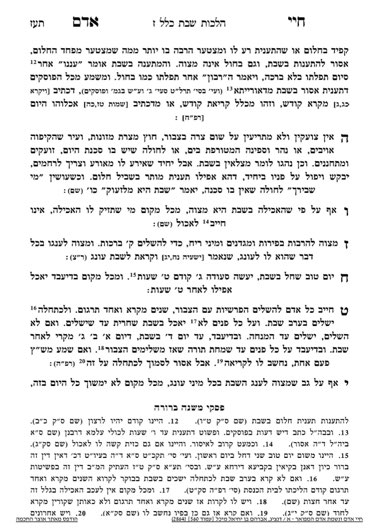The current series, which will cover seudos Shabbos and fasting on Shabbos, is available for sponsorship. Please contact Rabbi Reingold for more information.
We are beginning siman 5. The Chayei Adam writes that we do not have public tefillos out loud nor are we masriah on Shabbos for tzaros facing the tzibbur. Being masriah refers to blowing the shofar and chatzotzros as part of the tefillah process for a taanis. The Shulchan Aruch brings that the halacha deoraysa is to be masriah, and the Mishnah Berurah goes through a lengthy explanation as to why we no longer practice it ever.
Either way, the Chayei Adam writes that being masriah and public tefillos are not done on Shabbos. However, if there is a famine, or a city is being besieged, they should daven on Shabbos, because these are immediate needs. Other examples of immediate needs include a river threatening to flood a city, a ship which is potentially in danger of capsizing, or a person who is ill and may die. In all of these circumstances, we are not masriah, but we may call out in tefillah on Shabbos.
The Chayei Adam writes that similarly, the minhag is to say mitzla’in on Shabbos. The meaning of mitzla’in is not clear to Rabbi Reingold. It could be part of a colloquial phrase which meant that it is muttar to daven for a sick person on Shabbos, or it could be referring to a specific tefillah which was said on behalf of a sick person.
The Chayei Adam clarifies that the above refers to a hardship facing the tzibbur. However, an individual who is facing a personal need may not daven publicly about the issue. However, he can daven privately, even with nefilas apayim. We know that even fasting is muttar for a bad dream, so certainly davening is muttar.
The Chayei Adam writes that when making a mi shebeirach for a sick person, if the person is dangerously ill, we do not add the phrase Shabbos hee mi’lizok (“it is Shabbos so we cannot cry out in tefillah”) because it is muttar to cry out. We only add it for a person who is not dangerously ill, because for such a person it is not muttar to cry out.
Summary
- The tzibbur is allowed to cry out for an immediate tzarah facing the tzibbur.
- An individual can cry out privately for any personal tzarah which is immediate, and can even daven with nefilas apayim.
- When making a mi shebeirah for a sick person, if the person is dangerously ill, we do not add Shabbos hee mi’lizok, since it is muttar to cry out. It is only added for a person who is not dangerously ill.



